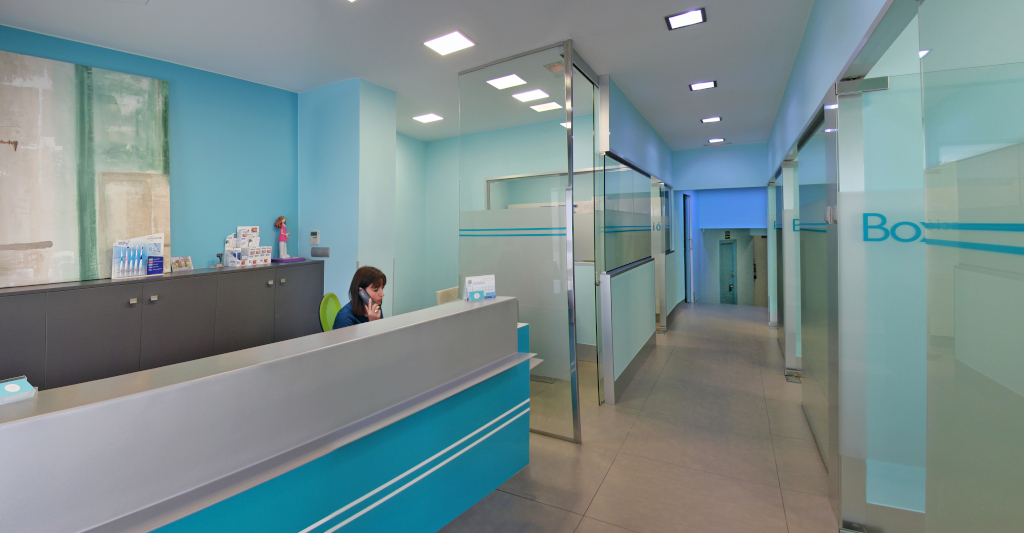
First we must differentiate between the terms FEAR and PHOBIA. Fear is a matter of mentalising and that’s it. But when we talk about a real phobia of the dentist, the patient who suffers from it may have trembling hands, sweating, palpitations, anxiety or panic attacks….
So today we are going to try to provide some tips to overcome the phobia:
1. Go to a specialist to help you overcome the phobia.
2. Take an anxiolytic before going to the dental appointment.
3. Consider conscious sedation as an option for treatment. This option will simply help you enter a state of deep calm, guided by an anaesthetist who will be present throughout the treatment.
It is important to:
1.Analyse the causes of fear
– A previous bad experience.
– You do not want to be in pain (for any procedure that may cause pain, the dentist will give you anaesthesia).
– You are afraid of needles or other instruments.
– You are afraid that you will need anaesthesia because you don’t like needles in general and even less to be pricked in the mouth in particular. (It is true that sometimes it can be perceived as something unpleasant, but more and more needles and techniques are being used that make you feel the prick less and less).
– As for the instruments, they are all designed to help you, and it may help if we can explain to you how they work and how to use the device in question that you are afraid of.
– You have neglected your mouth too much and now you are embarrassed. We will never judge you. Only you know your circumstances. Now you are looking for a solution and it is our job to give you one. It is good for both of you that you are coming to the clinic.
– You don’t want bad news (the longer you wait, the bigger the problem will be).
– You are afraid of anaesthesia. The amount of anaesthesia we are going to use is just the right amount to treat the part or parts that need to be fixed. The only thing you will feel is… you won’t feel anything.

Tips for overcoming fear of the dentist as an adult:
1. A calm first visit
We will carry out a check-up, where we won’t have to do anything more than look at the general state of your teeth and gums.
The aim of this first, innocuous visit is for you to check if you like the clinic, if the person who attends you is pleasant and inspires confidence in you. Also, if you feel at ease, you will be able to feel confident to talk to your dentist about your fears and what makes you nervous.
2. Go to the dental clinic when it’s less crowded
This is usually early in the morning, because it is the time of day when most people are at work. Also, since it’s in the morning, you’ve already “got it out of your system” for the rest of the day and you’ll get it behind you as soon as possible. Although in your eagerness to get it over with as soon as possible, you should not go to your appointment early. Sitting in the clinic waiting for your appointment is likely to increase your nerves. Arrive at the time you are supposed to arrive.
3. Take control of the visit
Explain your fear to us and we will usually agree on a signal to let you know when something is wrong.
In fact, before we start a treatment we usually tell you to raise your hand if you notice something that bothers you. If this happens, we will stop the treatment and it will continue only once the problem has been solved.
4. Listen to music
Although there is usually music in the waiting room, you can bring your own music to listen to with your headphones, also during the treatment.
And when we say music, we mean your favourite audiobook or the podcast you never miss. This will help you to distract yourself from thinking about what is going to happen or not happen in the consultation room.
5. Use relaxation techniques
Practice deep breathing exercises: breathe in slowly, hold the air in your lungs for a few seconds and breathe out slowly.
Repeat until you notice that your heart rate is steady and slow, that you no longer feel nervous.
6. Finally, although this is not something that depends on you, it is something that you will be able to check on that first visit that we recommended. Look for a clinic where you will find empathy, calm and patience. We usually explain everything about what is going to be done and how. This will undoubtedly put your mind at ease. The more information you have, the more confident you will be that everything will go well.
In fact, given our experience, we usually detect immediately if you are a patient with a fear of the dentist. There are usually very obvious signs: from tension in your face, rubbing your hands together, throat clearing or nervous coughing… And we are used to dealing with these situations.
We hope we have helped you by reading this article and we hope we have given you the encouragement you needed to take a first visit.

